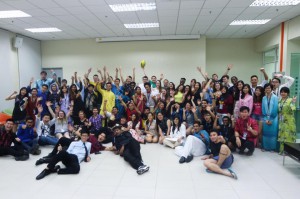June 6, 2016, by sustainablenottingham
Sustainability: a lot more than meets the eye
Ellen Salter, president of the Nottingham University Sustainability Society, writes:
“What even is sustainability?” “Does it mean you like the environment?” “Are you a tree-hugger?” – As President and Founder of the Nottingham University Sustainability Society, these are some of the questions that I am frequently asked. And at the World’s Most Sustainable University, it is startling how many people are unaware of what sustainability is. When I was initially asked to write this blog, I considered a range of topics that I could discuss: Our trip to the Hockerton Housing Project, why I founded the society, the Environmental and Social Justice Initiative Week, but none seemed applicable. Instead I considered how my personal understanding of sustainability has changed throughout the year, and how with sustainability, there is a lot more than meets the eye.
Its beguiling simplicity and flexibility is just one the reasons that I am so passionate about sustainability. Sustainability, like many contemporary theories and practices, can be understood in a plethora of ways: environmentally, socially, culturally, psychologically and even politically. It can be adapted and expanded, and in its own right, it can become a philosophy to which we centre our beliefs and our morals about the world, and the way in which we preserve and maintain it for future generations. Personally, I became interested in the concept when I was just nine years old, and I was “forced” by my family to watch “The Day After Tomorrow”. After initial reluctance, I began watching the film, and this struck a chord with me. I started to consider the extent of our selfish anthropocentric actions that I, in the heavy rain, placed posters around my local area urging people to switch off the lights, and to use less water. Of course, as a nine year old struggling to make sense of the world, I was initially captured by the personal-environmental perspective of sustainability; and this inspired my later behaviour, whether this was omitting beef from my diet, or writing a letter to the local MP about necessity of seal conservation. However, looking back, and as I began to understand more about the concept, I realised that sustainability should not be regarded as a unitary approach, but a multi-faceted vision that influences the way in which we live our lives.
Initiating the Sustainability Society at Nottingham University, the holistic principle of sustainability has governed the way in which the society has been organised, to consider the psychological, socio-cultural, economic and environmental components. As a society for instance, we provide welfare initiatives, such as meditation, to promote socio-psychological sustainability; we engage in projects and research analysis to further our understanding of sustainable behaviour; and we focus on environmentalism through trips to urban ecovillages and sustainable sites of interest. I am grateful to the society for the wide range of people that I have met, and the plethora of things that I have learned and discovered as a result. Throughout the year, I have been afforded the opportunity to engage with a range of interesting, inspiring and innovative individuals, each whose varied world views have greatly influenced their understanding and interest in sustainability. From a postgraduate student whose background in rural India encouraged his love for nature, and subsequent passion for renewable energy; to an international student who was inspired to become a vegan after an animal welfare campaign; to an undergraduate student who promotes her love for sustainability through the medium of creative arts; initiating the society has brought together a wide variety of individuals who are all driven by the same goal to make the world a better place.
However the society has not simply allowed the integration of students with a passion for sustainability; but has facilitated great networking opportunities between external companies and ourselves. As one of the only student focused sustainability societies in the UK, we have been contacted by many conservation companies, sustainable technology start-ups, and by those organising international sustainability conferences such as the upcoming CDLS conference in Switzerland. I and other members of the society were also able to attend the recent International Student Sustainability Conference in Malaysia and to meet with our global student partners from China and Malaysia. The integration between multitudes of individuals from a diversity of cultural backgrounds implies the subsequent strength of collective movements in sustainability. Of the things I have learned, discovered and developed, the most effective and beneficial realisations have occurred through collective partnerships. Clearly we all must take individual steps towards living more sustainably, but collective action proves to be highly beneficial, effective and engaging, aiding the widespread global transition towards sustainability.
What I’m trying to convey is two key ideas: Firstly, that everybody’s perspective of sustainability varies, and there is no right or wrong answer. Sustainability has been criticised as an empty buzzword, but I think that this simply highlights the beauty of the sustainable philosophy. Our socio-cultural experiences, our beliefs and moral values, and our character greatly influences the way in which we engage with the concept; and thus learning from the diversity of lived experiences from all around the world, I believe, provides the most effective way to learn about, and develop, sustainability practices. Secondly, promoting positive environmental change, can effectively be enhanced and accelerated through the collective movement and responsibility of a range of individuals.
As Dr Seuss states in the Lorax, “Unless someone like you cares a whole awful lot, nothing is going to get better its not.” The best time to get involved in sustainability was yesterday, and if not, there’s always today. Don’t be afraid to join the sustainable transition – many diverse individuals are already involved, and this promises to be the world’s greatest global movement.
No comments yet, fill out a comment to be the first


Leave a Reply